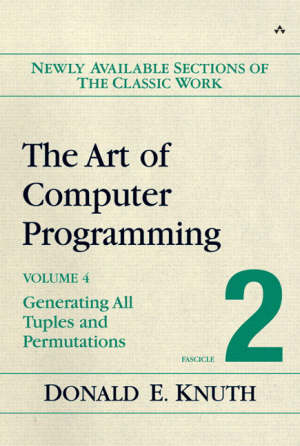

SPEDIZIONE GRATIS
con corriere veloce per acquisti oltre 29,00 €.
Pagabile anche con Carta della cultura giovani e del merito, 18App Bonus Cultura e Carta del Docente
To begin the fourth and later volumes of the set, and to update parts of the existing three, Knuth has created a series of small books called fascicles, which will be published t regular intervals. Each fascicle will encompass a section or more of wholly new or evised material. Ultimately, the content of these fascicles will be rolled up into the comprehensive, final versions of each volume, and the enormous undertaking that began in 1962 will be complete.Volume 4, Fascicle 2
This fascicle inaugurates the eagerly awaited publication of Knuth's "The Art of Computer Programming, Volume 4: Combinatorial Algorithms." Part of what will be a long chapter on combinatorial searching, the fascicle begins his treatment of how to generate all possibilities. Specifically, it discusses the generation of all n-tuples, then extends those ideas to all permutations. Such algorithms provide a natural motivation by means of which many of the key ideas of combinatorial mathematics can be introduced and explored. In this and other fascicles of Volume 4, Knuth illuminates importanttheories by discussing related games and puzzles. Even serious programming can be fun.











Il sito utilizza cookie ed altri strumenti di tracciamento che raccolgono informazioni dal dispositivo dell’utente. Oltre ai cookie tecnici ed analitici aggregati, strettamente necessari per il funzionamento di questo sito web, previo consenso dell’utente possono essere installati cookie di profilazione e marketing e cookie dei social media. Cliccando su “Accetto tutti i cookie” saranno attivate tutte le categorie di cookie. Per accettare solo deterninate categorie di cookie, cliccare invece su “Impostazioni cookie”. Chiudendo il banner o continuando a navigare saranno installati solo cookie tecnici. Per maggiori dettagli, consultare la Cookie Policy.